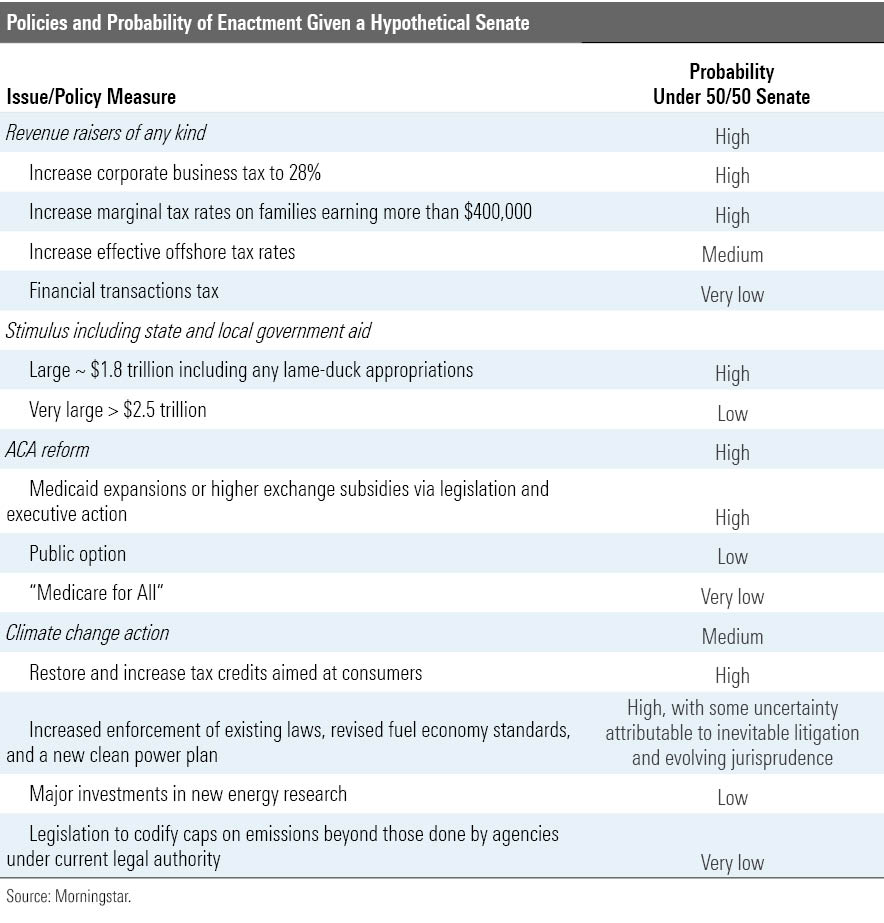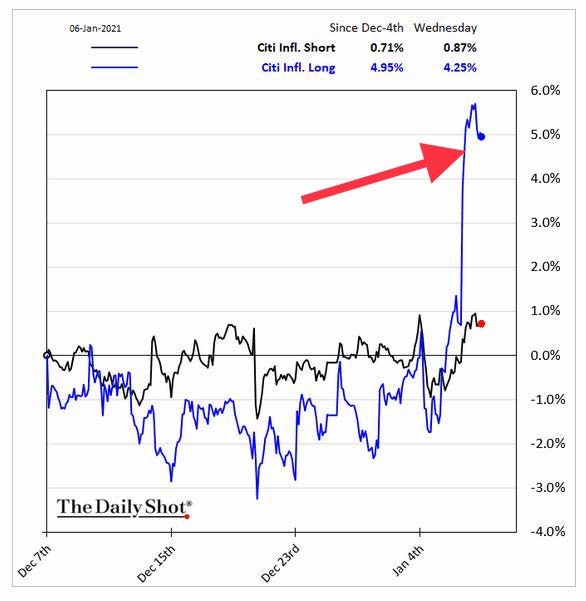It seems ridiculous in times like these to write a newsletter about finances and money, but we feel it is our responsibility at Towerpoint Wealth to do so, even if only to provide some respite from politics to our growing family of readers and Trending Today subscribers. We have heard from a few clients that, for a number of good reasons, you already feel like this:


And while we understand that it has been a tumultuous week, let's not be too quick to throw in the towel on 2021!
2020 ended with a record close for both the the S&P 500 (3,756.07, representing a +16.3% price gain for the year) and the Dow Jones Industrial Average (30,606.48, representing a +7.2% price gain for the year). So far in 2021, equity prices have continued their upward trend, even with concerns including:
- The economic implications of the Democratic wins in both Georgia Senate runoff elections and the tumultuous events in our nation’s capital on January 6th
- The likely trajectory of a resurgent third coronavirus wave
- Expectations of additional public health-driven economic restrictions and/or lockdowns
- A deflation of the currently high levels of investor optimism
- Growing levels of speculative activity in some quarters of the market (high volumes of options trading, a robust IPO calendar, and the popularity of cryptocurrencies)
- An interval of market consolidation following such an annus mirabilis as investors have experienced over the past 12 months in the financial markets.

While recognizing the cogency and reality of these concerns, at Towerpoint Wealth we have maintained an essentially constructive view of equity prices, based upon the following factors:
- Continuing monetary stimulus from the Federal Reserve, with ultra-low policy interest rates and $120 billion per month in “Quantitative Easing” money printing, augmented by significant growth in the M-2 money supply, which tends to produce a stimulative environment for consumer prices, GDP, and financial assets (as shown below, over the past year, the U.S. M-2 money supply has increased at +25.2%, the highest rate of growth in four decades!);

- Likely further fiscal stimulus in the form of infrastructure spending and (possibly) more pandemic relief payments;
- The advent and rollout of vaccines (even though several notable cases of hitches and delays have been experienced thus far); and
- No second round of recession — with households’ high savings rates and cash balances creating pent-up consumer demand; a robust housing sector; and elevated economic activity in the manufacturing sector
Although we believe stock valuations are elevated and investor optimism is high, equity prices were well aware of and already somewhat discounting the possibility of the outcome of the Georgia Senatorial runoff elections tilting Democratic. Additionally, after a possible short-term pullback/correction, the stock market can continue to move higher, with extra caution and care called for, and perhaps even with some cash raised that can stand ready to be invested on a disciplined basis during a market retrenchment.
Implications of the Georgia Senatorial Elections
In our opinion, assuming no defections from party lines, a Democrat-controlled Senate appears likely to produce:
- Higher Taxes: Tax increases may not necessarily materialize to the degree that markets may have feared earlier, given that the Senate is likely to feature essentially a 50-50 Democratic-Republican tie — with Vice President-elect Kamala Harris in a position to cast a tie-breaking vote in favor of the Democrats, and with Senator Joseph Manchin III (D, WV) and/or others possibly voting to weaken or reject the tax increases. With some delays and/or dilutions, higher corporate, payroll, income, capital gains, and estate taxes may eventually be on the horizon for many taxpayers (the proposed levies in the Democratic platform amount to $4 trillion, with something in the neighborhood of half that amount deemed likely to be passed). The essential tie in political power in Congress may limit the extent of any changes in tax policy, and an important consideration to be kept in mind is the effective date of any tax increases, including the possible likelihood of retroactivity to January 1st, 2021.
- More Spending: With proposed spending increases amounting to $7 trillion stretched out over a decade, the new Administration favors entitlement expansion, healthcare, climate, and green infrastructure initiatives (to accelerate the use of clean energy in the power sector, building construction, and transit); hiking the minimum hourly wage to $15 (which could support household incomes and augment growth in consumption); housing; education; and infrastructure. President-elect Biden has several times expressed support for drug price reforms.
- Increased Regulation: Through job appointments, executive action, and legislation where feasible, the Biden administration may favor increased restraints on the financial sector and some portions of the healthcare sector, with continued antitrust and market dominance scrutiny applied toward mega-cap technology and social media companies. Statements by President-elect Biden have indicated that his administration might limit pipeline approvals and curtail drilling activity on federal lands.
- Spotlight on Relations with the Judiciary: Although we deem such actions unlikely, President-elect Biden may possibly favor certain proposals from within his party to attempt to curtail the Supreme Court’s authority over specific laws by attempting to: (i) impose term limits; (ii) expand the size of the Court; or (iii) through legislative action, divest the Court of its authority over contentious social issues (referred to in academic circles as “jurisdiction stripping”). Any proposed limitation of the Supreme Court’s own powers will very likely spark intense and determined pushback via lawsuits by the Supreme Court as well as by battling parties on either side of the issues involved.
“Blue Wave” Affected Sectors
Democratic control of the White House, the House of Representatives, and (even if by the narrowest of margins) the Senate (a so-called “blue wave”) could be deemed favorable to large managed-care organizations, renewable energy firms, and the ESG space (companies reflecting and/or supporting Environmental, Social, and Governance initiatives and ideals). Other perceived sectoral beneficiaries of a “blue wave” include, among others: the weakening of the U.S. dollar versus foreign currencies; tax-exempt state and local government municipal bonds; high-yield bonds, small-cap stocks; construction and engineering, manufacturing, materials, industrial machinery, and related firms focusing on the U.S. transportation, maritime, and aviation infrastructure; renewable energy (including wind farms, solar projects, and high-voltage direct current transmission facilities); healthcare equipment and supplies; and cannabis-related companies.

Sectors perceived to be less favorably affected by a slim-margin “blue wave” include: large firms that benefited from the 2017 corporate tax cuts; large-cap pharmaceutical stocks; content liability-protected social network companies (currently shielded by Section 230 of the 1996 Communications Decency Act); dominant technology antitrust targets; the oil and gas sector; tobacco companies; aerospace and defense firms; health insurance companies; student loan servicing companies, asset managers, credit rating firms, and stock exchange operators; precious metals and precious metals mining shares; and labor-intensive enterprises sensitive to minimum wage increases (e.g., retail and grocery companies, restaurant and fast food chains, for-hire ride-sharing companies, and courier and package delivery firms).
What’s Happening at TPW?
Our Director of Research and Analytics, Nathan Billigmeier, and Partner, Wealth Advisor, Jonathan LaTurner, slipped away yesterday to play a round of golf at the #1 public golf course in America, Pebble Beach Golf Links!

Our President, Joseph Eschleman, found a good (albeit chilly) lockdown activity to do with his family last week, watching The Croods: A New Age at the West Wind Drive-In in Sacramento!

TPW Service Highlight – Client Family and Culture
In addition to providing them with the economic peace of mind that comes with the suite of comprehensive wealth management services we provide, as "family members" Towerpoint Wealth clients have also come to expect us to host regular, fun, and unique client appreciation and education events, which we happily deliver on. If you aren't currently a client, here is what you have been missing out on (!):
- Wealth and Health appreciation and educational dinner and seminar at The Vintage Monkey
- Renewable energy / responsible investing private dinner at The Grange
- Participatory cooking demonstration and family-style dinner at Mulvaney's B&L
- Test drive a Tesla!
Chart of the Week
As mentioned above, the news yesterday of the Democrats taking control of the Senate led investors to believe that the government will boost fiscal stimulus, which would in theory boost consumption and economic growth, and in turn, inflation.
The chart below compares the relative performance of stocks that benefit from inflation (blue) vs. those that benefit from deflation (black).

Trending Today
In addition to history making and money making, a number of trending and notable events have occurred over the past few weeks:
- Congress considers impeaching President Trump (again), or invoking the 25th Amendment and having him removed from office
- China's highest-profile entrepreneur and founder of Alibaba, Jack Ma, has not appeared in a public setting since late October, fueling speculation that he's lying low after the Chinese government responded to his critique of the regulatory system there
- The NFL playoffs begin this weekend, in a season that, amazingly, has been able to be played in full
- New Year's Eve was very muted this year, as pandemic restrictions limited people's ability to celebrate, in Times Square and elsewhere around the globe
- New laws went into effect for California on January 1 - do you know what they are?
- Audio emerges that threatens to attack the U.S. Capitol, avenging Iranian General Soleimani's death one year ago
As always, we sincerely value our relationships and partnerships with you, as well as your trust and confidence in us here at Towerpoint Wealth. We encourage you to reach out to us at any time (916-405-9140, info@towerpointwealth.com) with any questions, concerns, or needs you may have. The world continues to be an extremely complicated place, and we are here to help you properly plan for and make sense of it.






